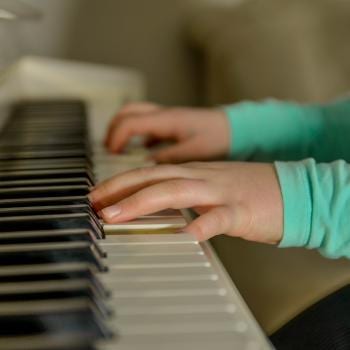 “I’m really angry with you, mom! I don’t like you right now! I don’t like you!”
“I’m really angry with you, mom! I don’t like you right now! I don’t like you!”
I don’t even remember what I’d done. I think maybe I told her that no, we weren’t going to get ice cream while we were out, or maybe I told her we really did have to go inside because I had to make dinner. Whatever it was, my preschool-aged daughter Sally was very upset with me.
But you know what? I didn’t try to stop it. I can’t control Sally’s emotions, and I’m not going to try to. I can’t force Sally to feel how I want her to feel, and even if I could I wouldn’t do it. Sally’s emotions are hers, not mine. And yes, that means that sometimes she’ll get mad at me. And sometimes I get mad at her, too. And that’s okay. In fact, it would be kind of weird if we never got frustrated or upset with each other.
So I didn’t punish Sally for her announcement. Instead, I affirmed it. “It’s okay, honey. Sometimes people get mad at other people.” I went on: “I know you’re upset that we can’t get ice cream right now [or whatever it was]. That would make me mad too! It’s hard not always being able to do whatever we want. If I could do whatever I wanted right now, I’d be kicked back on the couch with some chocolate and a glass of wine watching those episodes of Parks & Rec that I still haven’t seen! But sometimes we can’t just do whatever we want, and yes, that sucks. I get angry about it sometimes too. Okay?”
We have these sorts of conversations a lot. Sometimes Sally responds with “Stop talking to me, mom!” And so I do. I give her space. Sometimes she listens but doesn’t engage—in these cases, I try very hard to avoid lecturing or patronizing and to focus on reassuring and guiding (though I’m not perfect). Most often, we have an actual back and forth conversation. You’d be surprised at how intelligent and thoughtful and cognizant preschoolers can be when you treat them like people rather than like problems.
While I don’t believe in trying to control Sally’s emotions, I do believe in trying to help show her learn how to handle her emotions herself. Sometimes that means just giving her time and space, and sometimes that means more direct involvement. Like the time she hit me when she was mad. I told her that it was okay to be mad, but it wasn’t okay to hurt other people, and that if she couldn’t keep from hurting people while she was mad she would have to go to another room until she felt better. I told her that if she wanted to hit something, she could, but that she couldn’t hit a person, because that would mean causing someone else pain. I offered her a mixing spoon and suggested she go outside and hit the grass. She didn’t take me up on it, but she also didn’t hit me again.
I also talk to Sally about how we can hurt others with our words, and about how sometimes when we’re mad we can end up saying things we wish we hadn’t. Of course, I make sure I’m understanding, and perhaps in part because I grew up in a household that practiced authoritarian discipline methods, it doesn’t hurt me when she tells me she doesn’t like me—instead, I’m just pleased that she’s actually allowed to express that feeling. Still, I think she’s starting to understand the whole thing about saying she’ll regret. In the example I began this post with, Sally later came to me and apologized. “I love you mom, I’m sorry I was mean to you.” But then, that’s something I model for her too—if I’m overly harsh or short with her because I’m stressed out, I later apologize.
As a parent, I’m a guide and a facilitator, not a dictator. I don’t tell Sally how to feel, but I do try to help her learn how to deal with her emotions in a healthy way. And I remember, too, that I’m not perfect either.














